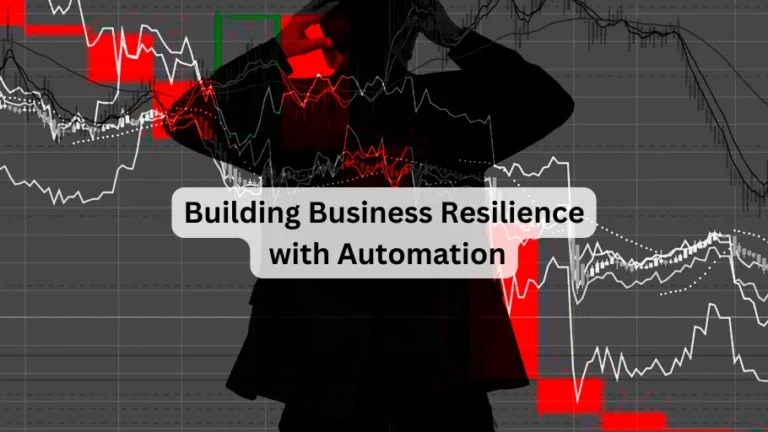A recession can cause many challenges for a wholesale business. Fluctuating demand can affect inventory management. Reduced customer spending can lead to a loss of profit.
Wholesalers need to take steps to ensure a recession-proof business. An ERP software with automation can be the solution.
Automated ERP integration can streamline operations, save on expenses, and increase efficiency. These benefits of B2B eCommerce software can help wholesalers stay financially resilient.
In this article, we highlight how to be recession-proof with ERP software automation.

Streamlining Order Management
Order management involves receiving, managing, and fulfilling customer orders. It includes tasks like verifying order details and preparing the orders for shipment.
Automation can streamline order management processes. This helps wholesalers with efficient operations and reduces errors, saving on unnecessary expenses. Automation can speed up order fulfillment, boosting client satisfaction.
Automation also enables seamless integration with eCommerce platforms and marketplaces. This integration ensures that inventory and pricing data are accurate across different channels. By maintaining real-time information, wholesalers can reduce the risk of overselling products that can cause client dissatisfaction.
Enhancing Inventory Management
Inventory management is an important part of running a wholesale business. It involves keeping track of the products in stock and making sure there is enough to meet customer demand. Efficient inventory management is essential for wholesalers to maintain a recession-proof business.
Automation helps with efficient inventory management by monitoring stock levels in real time. When products are running low, the system can send alerts to the wholesaler so they can restock in time. This proactive approach enables wholesalers to avoid stockouts and missed sales opportunities.
Effective inventory management also prevents over-stocking of products. Holding excess inventory can increase storage costs and product wastage. With inventory forecasting, automation can ensure optimal stock levels to reduce unnecessary costs.
Supporting Supplier Management
Automated supplier management systems assist seamless communication between wholesalers and suppliers. This allows for quick and efficient information sharing order updates, and issue resolution. This helps maintain strong relationships and ensures smooth collaboration even during economic downturns.
Automation eliminates manual processes and reduces administrative tasks associated with supplier management. Automated systems handle tasks such as order placement, invoicing, and tracking, saving time and resources.
Automated supplier management systems generate comprehensive reports and analytics on supplier performance. Wholesalers can use this data to make informed decisions about supplier relationships and negotiate better costs.
Effective Customer Relationship Management
Customer Relationship Management (CRM) is essential for wholesalers looking to protect themselves against a recession. CRM helps wholesalers build long-term relationships with customers and drive revenue growth. Automated CRM systems allow wholesalers to deliver exceptional service and strengthen customer loyalty.
Automated CRM systems segment customers based on their buying behavior and order history. This segmentation enables wholesalers to personalize marketing campaigns and offer tailored promotions. This can increase customer engagement and sales.
Automation also streamlines customer support by providing self-service options. Customers can access automated tracking updates or place order status inquiries. This saves valuable time and costs for wholesalers.
Leveraging Data Analytics and Business Intelligence
The importance of data analysis and business intelligence (BI) tools play a big role in a recession-proof business. Data analysis and BI tools provide valuable insights to drive decision-making. This data can assist wholesalers increase efficiency and cut costs.
Here’s how automation in data analytics and BI helps recession-proof a wholesaler:
- Real-time Insights: Automated data analytics tools collect and process data in real time. This allows wholesalers to access up-to-date information about their operations and customer behavior. Wholesalers can identify changes in customer demand or market conditions, ensuring they stay ahead of the curve.
- Predictive Analytics: Automated data analytics tools use advanced algorithms and models to analyze historical data, identify patterns, and generate insights. Wholesalers can leverage these insights to expect market trends, forecast demand, and make proactive business decisions.
- Operational Efficiency: Automation in data analytics and BI streamlines the data collection and reporting processes. This reduces manual effort and human error. Wholesalers can automate data integration from various sources, saving time and improving accuracy. This increase in operation efficiency allows wholesalers to focus on strategic activities.
- Cost Optimization: Automated data analytics and BI can help wholesalers identify cost-saving opportunities. By analyzing data, wholesalers can identify areas of inefficiency and reduce unnecessary costs. This cost optimization helps wholesalers maintain profitability.
Streamlining Financial Management
ERP system with automated wholesale accounting software can assist wholesalers during a recession.
Automation helps to simplify financial processes, such as invoicing or financial reporting. This can reduce errors and save time on manual data entry. Wholesalers can then use these resources in other areas of the business.
Automation also provides real-time visibility into financial data. This allows wholesalers to check up-to-date information about income and expenses. Wholesalers can then make informed decisions about cash flow, budgeting, and cost control.
Optimizing Logistics and Shipping
Efficient logistics and shipping operations help wholesalers meet customer demands and reduce costs. Automation can optimize these processes. This optimization leads to faster order fulfillment, accurate tracking, and cost-effective shipping options.
Automated systems can integrate with shipping carriers. This enables wholesalers to compare rates and track shipments in real time. This streamlines the entire shipping process and minimizes errors or delays.
Automated logistics allow wholesalers to provide accurate shipment tracking and timely deliveries. This can enhance customer satisfaction and safeguard their business.
Ensuring Cybersecurity
Having ERP software with robust security features is essential for wholesalers. Keeping data secure helps protect sensitive information and ensures regulations compliance. This can prevent any financial losses from data breaches that could impact wholesalers during a recession.
Automation helps wholesalers protect sensitive data and maintain the trust of their customers.
We highlight a few ways that automation assists with security in the ERP system:
- Access Control: Automation helps enforce strict access control. This reduces the risk of unauthorized access or data breaches.
- Encryption: Automation enables data encryption techniques within an ERP system. This protects sensitive information during storage and transmission. Encryption converts data into a secure format, adding protection against unauthorized access.
- Monitoring and Alerts: Automated security monitoring systems watch the ERP system for any potential security threats. They generate real-time alerts to notify administrators of any anomalies. This enables quick response to prevent security breaches.
Enjoy the Benefits of Automated ERP Software with Salesorder
Salesorder offers an automated ERP software solution for wholesalers. Our automation enables you to optimize various operational processes. With our ERP software, you can streamline operations, enhance efficiency, and improve productivity.
Get in touch to discuss our ERP software automation features.





